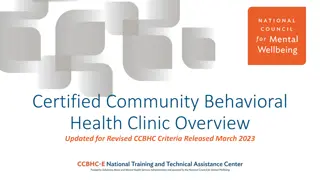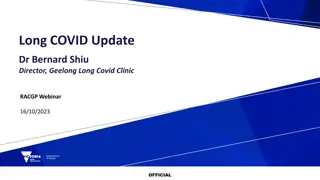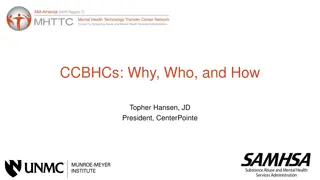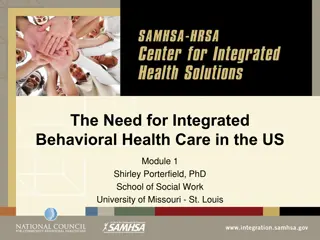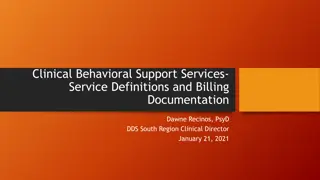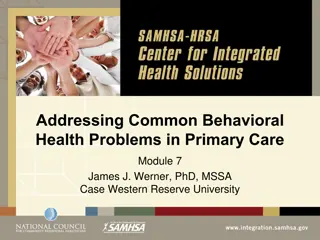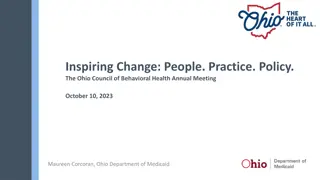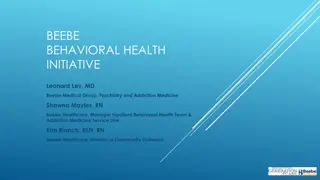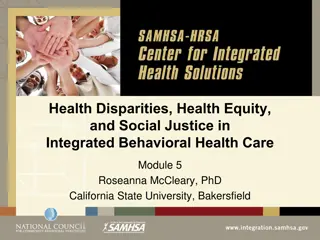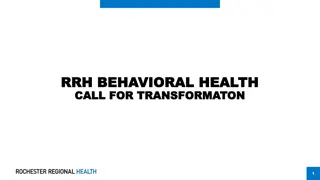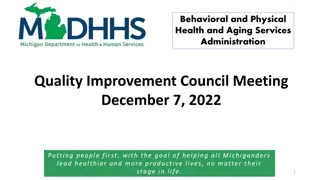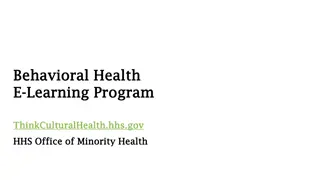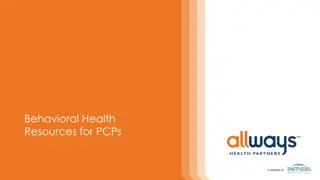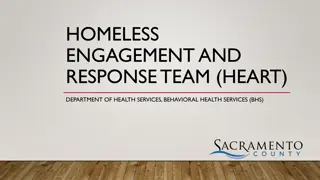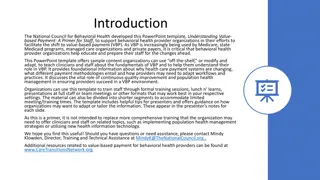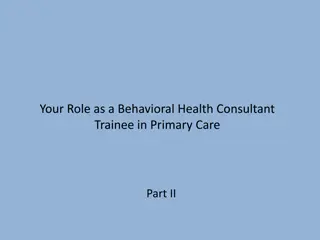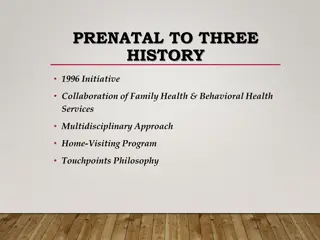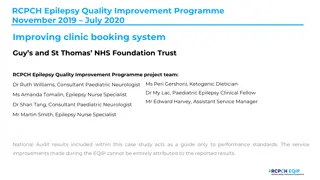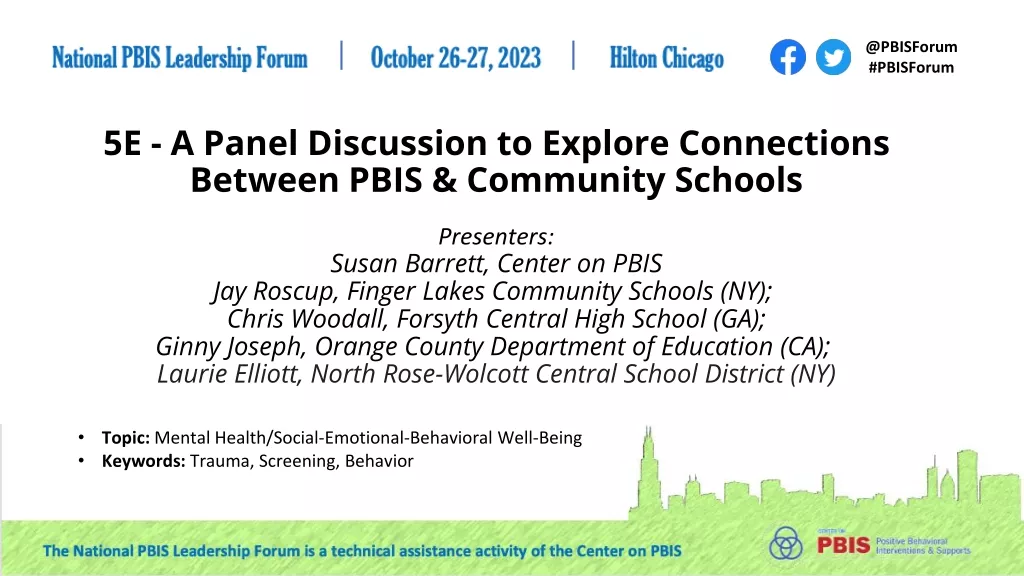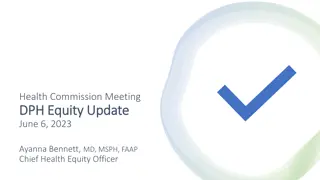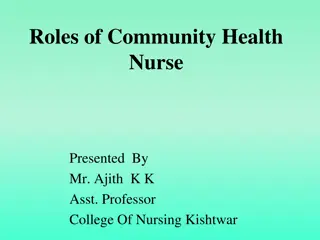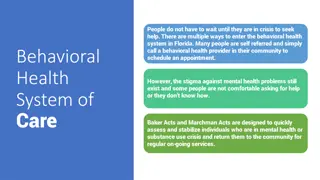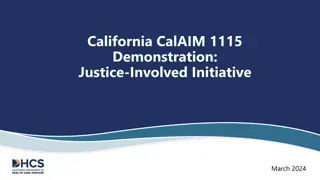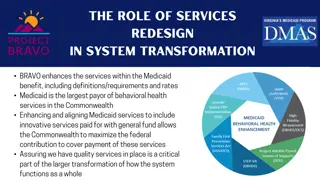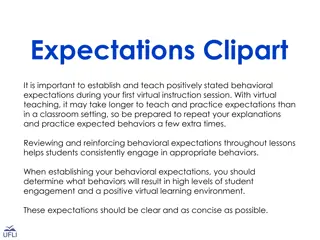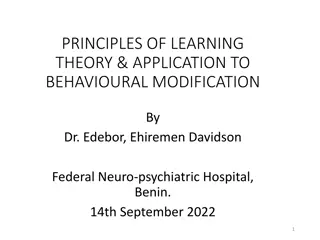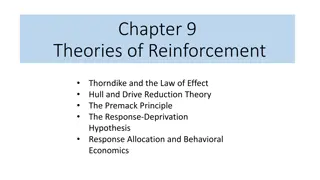Comprehensive Overview of the Certified Community Behavioral Health Clinic (CCBHC) Model
The Certified Community Behavioral Health Clinic (CCBHC) Model is an innovative approach to improving and expanding behavioral health care by focusing on outcomes and prospective payments. It involves meeting stringent criteria, receiving funding for services, and ensuring access to integrated care. Initially created through the Protecting Access to Medicare Act, CCBHCs offer a range of required services such as outpatient care, crisis services, treatment planning, and more. With approximately 430 CCBHCs operating in 40 states, this model emphasizes collaborative and outcome-focused care delivery.
Download Presentation

Please find below an Image/Link to download the presentation.
The content on the website is provided AS IS for your information and personal use only. It may not be sold, licensed, or shared on other websites without obtaining consent from the author. Download presentation by click this link. If you encounter any issues during the download, it is possible that the publisher has removed the file from their server.
E N D
Presentation Transcript
The Certified Community Behavioral Health Clinic Model (CCBHC) Innovation in Behavioral Health Care Commission on Mental Health and Substance Use Melanie Brown-Woofter, FBHA November 17, 2021
A New Model The CCBHC Model is built on the concept that the way to expand and improve behavioral health care is to pay for the activities that make this possible and incentivize the right care at the right time. Meet stringent criteria regarding timeliness of access, quality reporting, staffing, and care coordination Receive funding to support the cost of improving services and expanding access to meet the need in communities Ensure access to integrated, evidence-based behavioral health care
Innovative and Collaborative Approach The state pays for outcomes rather than a patchwork of programs and services CCBHCs must: Meet a rigorous set of criteria in order to Obtain certification; and Be eligible for prospective payment AND Meet or exceed established outcome measures to maintain certification CCBHC demonstration programs included services not traditionally reimbursed by Medicaid like outreach, care coordination, and others Integrates community resources into care and coordinates with law enforcement, courts, hospitals, and housing Prospective payment financing Ensures budget predictability
Brief History CCBHCs were created through the Protecting Access to Medicare Act as a Medicaid demonstration program SAMHSA established the certification criteria Initially eight states were selected for the Medicaid demonstration Since 2018, Congress has annually appropriated funds for CCBHC expansion grants Approximately 430 CCBHCs are operating in 40 states, plus Washington, D.C. and Guam Florida CCBHC Implementation Grant awards to Providers = 15 Total CCBHCs 2020 - four awards 2021 (January) - eight awards 2021 (July) - three awards
CCBHC Required Services Must be delivered directly by a CCBHC (crisis services may be delivered by a state sanctioned alternative) Outpatient Services for Mental Health & Substance Use Disorder Crisis Services (24-Mobile Response and Crisis Stabilization) Patient- Centered Treatment Planning CCBHC Screening, Assessment, Diagnosis Delivered by a CCBHC or a Designated Collaborating Organization (DCO) Services for Armed Forces, Veterans, and their Families Primary Health Screening & Monitoring Peer Support & Family Supports Psychiatric Rehabilitation Services Targeted Case Management
Impact Nationally CCBHC outcomes as of January 2020: *reported by SAMHSA and National Council for Mental Wellbeing 61.6% Reduction in Hospital Admissions 62.1% Reduction in ED Visits 15.2% Increase in Employment or Starting School 30.4% Increase in Mental Health Functioning 17% Increase in Persons Served
Missouri: Demonstration Program State Plan Amendment to implement Longest-running CCBHC demonstration Outcomes: Increased number of patients served 23% Increased number of patients receiving MAT 101% Increased number of school-based services 91% 77% of new patients received an intake evaluation within 10 business days Texas: Independent Implementation 1115 Waiver to implement The CCBHC model is projected to save $10 billion by 2030 Within two years, there were no wait lists at any CCBHC clinic 40% of patients were treated for cooccurring SUD and SMI needs, compared to 25% at other clinics
HEDIS Measure Outcomes 2019 HEDIS Measures for Missouri CCBHCs, Other States and Florida *as reported by the Centers for Medicare & Medicaid Services (CMS) Missouri CCBHCs Core Measures Other States Florida Follow Up After Hospitalization in 30 Days (adults) 74% 55% 40% Follow Up After Hospitalization in 30 Days (child) 78% 66% 61% Follow Up Care for Children Prescribed ADHD Medication | Continuation & Maintenance Phase 91% 59% 54% Follow Up After Mental Health ER Visit in 30 Days (adult) 70% 52% 45% Adherence to Antipsychotic Medications for Individuals with Schizophrenia 66% 59% 62% Adult Body Mass Index (BMI) Screening and Follow-Up 67% 84% 89% Diabetes Screening for People with Schizophrenia or Bipolar Disorder who are using Antipsychotic Medications 74% 80% 82%
Floridas Data National Outcome Measures Percent of patients reporting positive outcomes at baseline and 6-month reassessment (N=346) Positive at Baseline Positive at Second Interview 100% 90% 80% 70% 60% 50% 40% 30% 20% 10% 0% Attending school/ employed/ retired No serious psychological distress Were never using illegal substances Were not using tobacco products Not involved with the criminal justice system Functioning in everyday life Were not binge drinking Retained in the Community Had a stable place to live Socially connected Healthy overall Positive at Baseline 52.1% 45.9% 61.7% 55.2% 52.4% 86.6% 73.7% 55.9% 37.8% 97.7% 61.5% Positive at Second Interview 59.3% 60.0% 75.7% 63.9% 54.4% 91.2% 86.2% 55.9% 43.5% 100.0% 70.8%
Additional Florida Data First four CCBHCs report: Patients hospitalized for mental health care in the past 30 days decreased 80%; Patients spending time in a correctional facility in the past 30 days decreased 91.7%; and Patients utilizing an Emergency Room for behavioral health issues in the past 30 days decreased 66.7%
Prospective Payments Establishing a prospective payment reimbursement Ensures budget predictability Aligns CCBHC rates and actual cost of services Demonstration states are using two models of prospective payment: A daily rate which is a fixed amount for all services provided on any given day to a service recipient (similar to FQHC reimbursement) A monthly rate for each unduplicated patient who had one or more visits at the CCBHC in that month (similar to managed care capitation)
Next Steps: Legislative Action Direct State to Adopt Certification Standards Obtain Federal CMS Authority to Implement Develop Prospective Payment Methodology
Thank you Melanie Brown-Woofter, President and CEO Florida Behavioral Health Association email: melanie@floridabha.org office: 850-224-6048 cell: 850-567-1946 web: www.floridabha.org @Floridabha__


